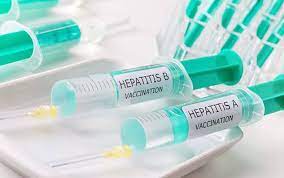Context:
Recently, Indian Immunologicals Ltd (IIL), a subsidiary of the National Dairy Development Board (NDDB), launched of the pediatric dose of India’s first indigenously developed Hepatitis A vaccine, Havisure (0.5 ml).
More on the News:
- Its aims to benefit the most vulnerable sections of society, especially children.
- Havisure will be available in two doses: 0.5 ml for children and 1 ml for adults.
- It aligns with the “Make in India” initiative and supports a healthier future for children.
- IIL is now the only company in India to develop an indigenous Hepatitis A vaccine.
About Havisure:
- The Havisure vaccine is priced at ₹2,150 per dose and is administered in a two-dose schedule.
- The first dose is given to individuals above 12 months of age, followed by a second dose at least six months later.
- This schedule is crucial for establishing effective immunity against Hepatitis A.
- The vaccine is comparable to leading global vaccines, such as GSK’s Havrix.
Hepatitis A
- It is an inflammation of the liver that can cause mild to severe illness.
- It can be an acute (short-term) infection or a chronic (long-term) infection.
- Transmission– The hepatitis A virus (HAV) is transmitted through ingestion of contaminated food and water or direct contact with an infectious person.
- Geographical Distribution: It is common in low- and middle-income countries.
- Symptoms: fever, malaise, loss of appetite, diarrhea, nausea, abdominal discomfort, dark-colored urine and jaundice (yellowing of the skin and eyes) and incubation period; 14–28 days.
- Treatment: As per WHO there is no specific treatment for hepatitis A. Recovery from symptoms following infection may be slow and can take several weeks or months.
- Prevention: Improved sanitation, food safety and immunization.
Eligiblility for the Vaccine:
- Havisure is recommended for various groups, including children as part of routine immunization, individuals traveling to areas with high Hepatitis A prevalence, and those with occupational risks or chronic liver diseases.
India’s Initiatives to Tackle Hepatitis:
National Viral Hepatitis Control Program: The aim of the program is to combat hepatitis and achieve countrywide elimination of Hepatitis C by 2030.
- Reduce the risk, morbidity and mortality due to Hepatitis A and E.
- Achieve significant reduction in the infected population, morbidity and mortality associated with Hepatitis B and C
India’s Universal Immunization Programme (UIP): Hepatitis B is included in India’s UIP which provides free-of-cost vaccination to children against 12 life-threatening diseases including Hepatits.
- The UIP provides free vaccines to 26 million children annually.
- The Government of India also has an Electronic Vaccine Intelligence Network (eVIN) that tracks the storage and logistics of vaccines at all levels.

